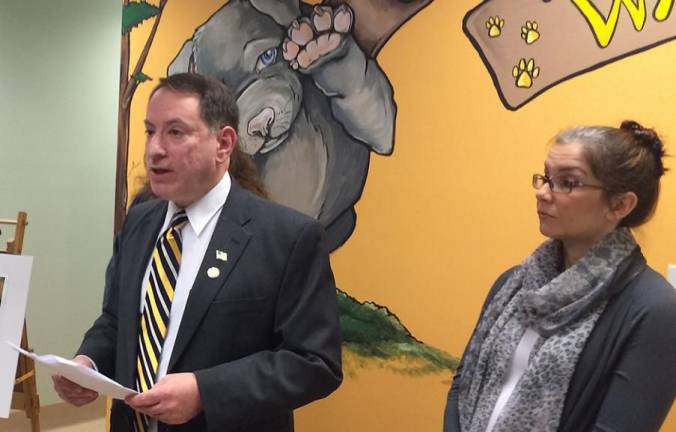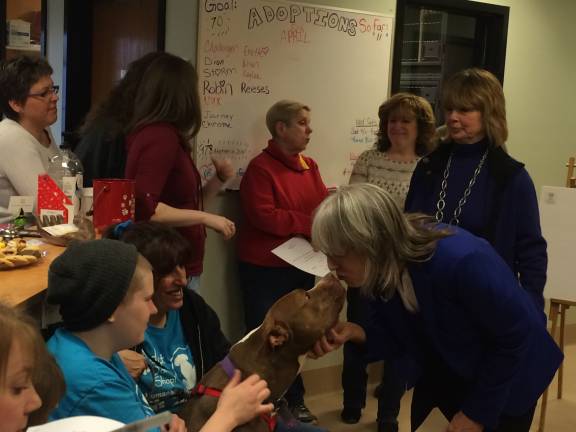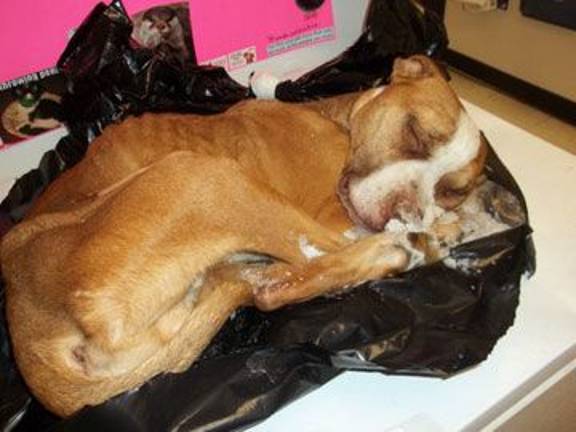Rocky's Law would stiffen animal abuse penalties



By Edie Johnson
GOSHEN — Two recent incidents of shocking abuse may lead to harsher penalties in Orange County.
This past winter in Newburgh, a pit bull named Rocky, left outside in frigid weather, succumbed to hypothermia and numerous rat bites before rescuers could save him.
At about the same time, a Newburgh woman was convicted of cruelty after subjecting her horses and ponies to terrible conditions on a farm on Tuthill Road in Blooming Grove. But the judge ordered that the horses be released back to their owner, pending sentencing in May. An Internet petition against returning the animals amassed 5,000 signatures within eight weeks of the judge's decision.
County Legislator Mike Anagnostakis (R-Montgomery, Newburgh) has proposed a new law that would prevent animal abusers from owning animals in the future. It's named "Rocky's Law," after the pit bull in Newburgh.
He said he proposed the law so that Rocky's death "will not have been in vain. It will at least stop those who have committed the most heinous crimes from ever getting their hands on our loved ones again. What a tribute to Rocky it would be if this law becomes enacted across the U.S.”
A registry for abusers
Some say the harsh winter has spawned a horrifying streak of abuse. Others say enforcement agencies are getting better at following complaints. Perhaps because of these reasons, three new laws — county, state, and federal — are being proposed to counter the problem of animal neglect and abuse.
In February, the FBI announced it will put those convicted of animal cruelty on a national registry. Enforcement agencies would then be able to track convicted offenders, and prevent them from simply crossing state lines to obtain new animals illegally.
New York State is considering making animal cruelty a felony and putting it under state jurisdiction, instead of leaving regulations to the Agriculture and Markets Division. State regulations primarily govern the care of livestock and working animals, and focus simply on making sure the animals are provided with sufficient food and water.
Anagnostakis said Rocky's Law would not change the way law enforcement officers investigate or prosecute cases. Those tasks, he said, will remain under state control. The proposed law would only affect the penalties set after conviction. Rocky's Law would not allow a judge to override the law preventing a criminal abuser from owning an animal within a certain amount of time.
Food-producing animals would be exempted under Rocky's Law.
Animal abuse registries have been established in other counties in the past. But penalties for an abuser who fails to register are either weak or non-existent. Rockland County, for instance, requires convicted abusers to register within five days, Anagnostakis said — but there are no penalties if they don't.
Anagnostakis said establishing the local registry could be as simple as adding a page to the county website, with the Sheriff's Office adding names with every new conviction. The county would also share its registry with the state and the FBI, if they ever establish registries of their own.
Rocky's Law would be self-funding because each registered offender would pay a $125 fee, Anagnostakis said.
He presented his proposed law at a press conference held at the Walden Humane Society, where many lost and abandoned animals have the chance to find new homes. Its director, Tracy Conrad, said 978 animals were adopted from the facility in just the last year.
The legislature's Rules Committee unanimously approved the proposed law on April 22, which means it will be presented to the full legislature for a vote at 7 p.m. on Thursday, May 7, at the Emergency Services Center. It would then proceed to County Executive Steve Neuhaus for his approval.
Orange County District Attorney David Hoovler and Undersheriff Ken Jones helped write the resolution for the Rules Committee and are "100 percent behind" the proposed law, Hoovler said.
"As a DA I think it's a good law," Hoovler said. "You can't go wrong with it."
Jones pointed to the link between animal abuse and crimes against people.
Hoovler said the district attorney would have the discretion to waive the registry fee on a case-by-case basis.